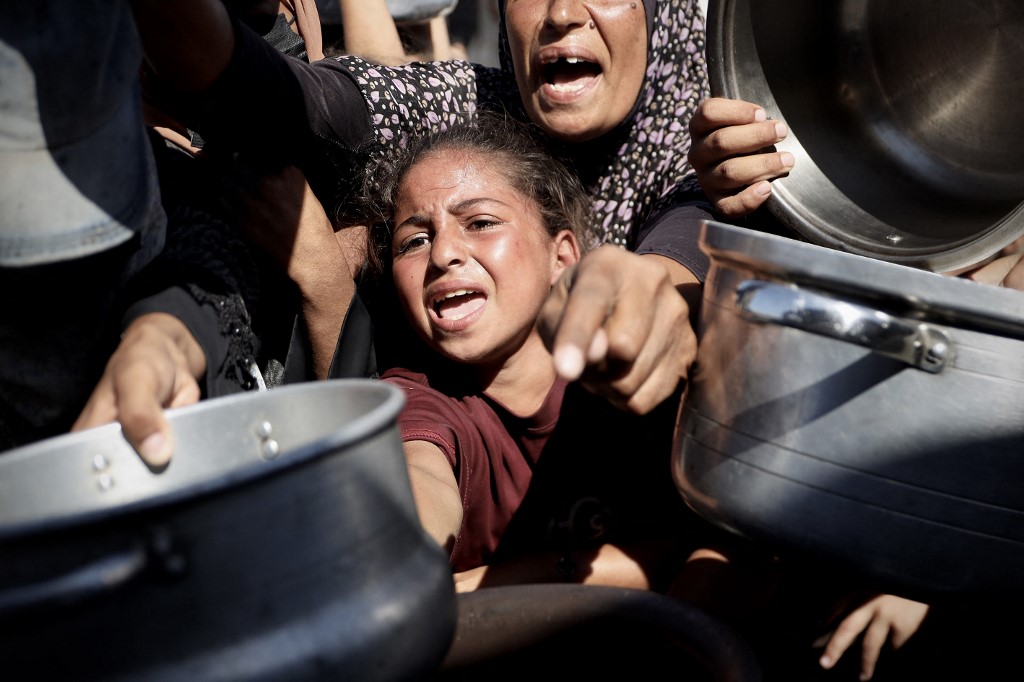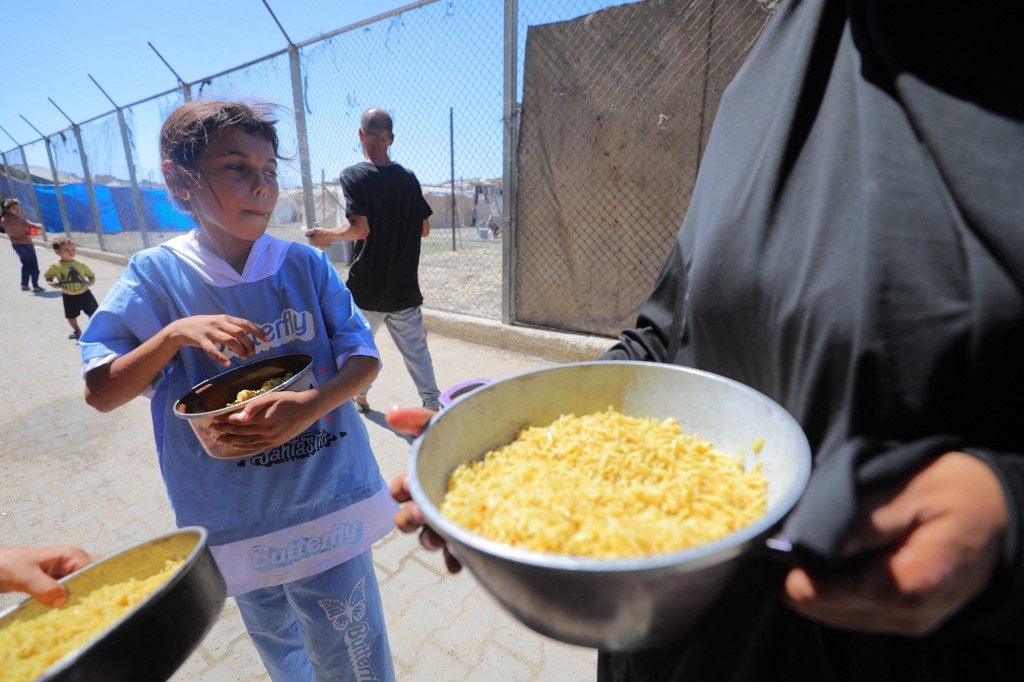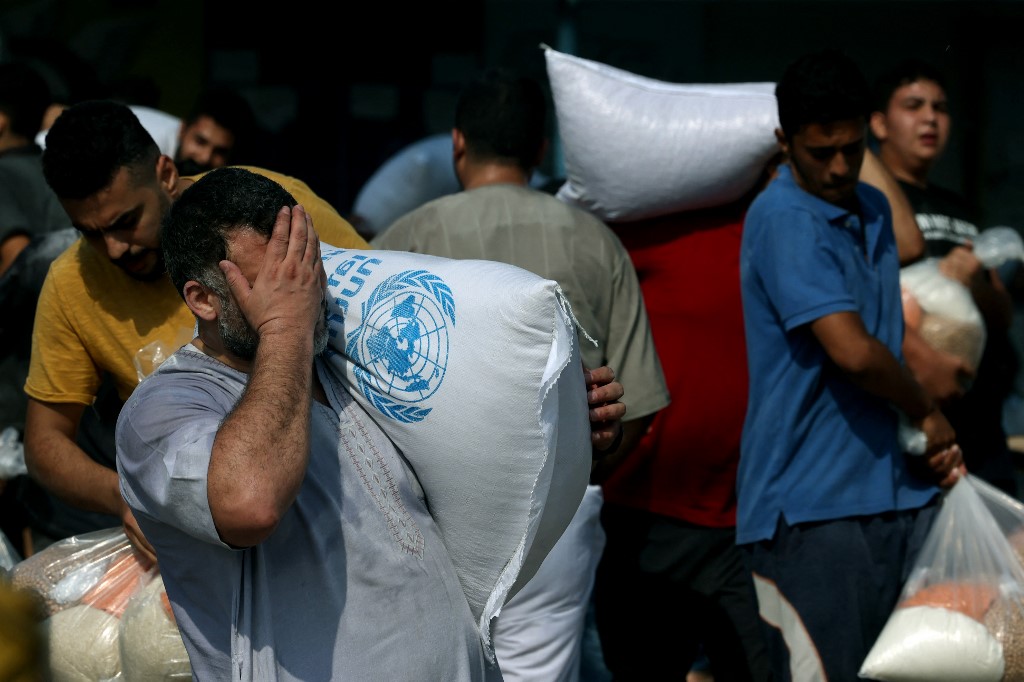
Terror Groups Steal Aid, Fueling Prolonged Conflict Zones
Dr. Netta Barak-Corren of the Hebrew University of Jerusalem and Dr. Jonathan Boxman outlined the devastating impact of aid diversion in war zones such as Somalia, Ethiopia, Syria, Yemen, Sudan and Afghanistan—before presenting the likely case of diversion in Gaza. Their research found that the looting of aid convoys and the systematic diversion of relief supplies have directly contributed to the prolongation of armed conflicts.
Somalia
In Somalia, researchers uncovered diversion “at every stage of the supply chain”: nearly half of the World Food Program’s (WFP) budget was lost to cartel transport fees, “ghost camps,” aid siphoned by fighters’ families, and theft by local “gatekeepers.”
Ultimately, only about 12.5–17.5% of aid reached Somalis in need, according to the report.
A “strictly confidential” July 2023 UN internal report commissioned by Secretary-General Antonio Guterres included testimonies from Somali internally displaced persons (IDPs) who said they were “forced to hand over half of their cash assistance to those in power or face eviction, arrest, or removal from the beneficiary list,” Reuters reported.
Ethiopia
In Ethiopia, researchers found that WFP “turned a blind eye” to aid diversion—particularly when the Ethiopian military forced local mills to grind 30 tons of looted grain into flour for soldiers.
The U.S. Agency for International Development (USAID) eventually discovered the scheme and suspended assistance to Ethiopia.
New study says aid theft by terror groups and regimes is prolonging global conflicts https://t.co/eB1HrcsyUt pic.twitter.com/4jY50Dgh2D
— World News (@Worldnews_Media) September 1, 2025
Reuters also found WFP had been aware of the diversion “for years.” Responding to concerns raised in 2024, WFP director Cindy McCain declared that the agency has a policy of “zero tolerance for theft or diversion.”
Syrian Civil War (2011–2024)
During the Syrian war, President Bashar al-Assad “dictated the terms of humanitarian aid,” including skimming off about 51% through currency conversion schemes, and blocking aid from reaching opposition-held areas, deemed “too dangerous” for distribution.
David Adesnik, Research Director at the Foundation for Defense of Democracies, told Fox News Digital that Assad’s financing “fueled a war of annihilation.”
“It’s not just about losing or wasting aid,” he said, “it’s about actively aggravating the conflict and causing more violence,” he said.
Yemen (2014–present)
While the UN reported only about 1% of aid “going missing,” researchers noted that roughly 60% of beneficiaries never received their aid, as Houthi loyalists commandeered it or bad actors sold it on the black market.
Sudan (2023–present)
In Sudan, warring parties attempted to block aid from reaching their enemies. When WFP aid was looted, officials admitted they couldn’t identify the culprits for fear of expulsion from the country.
According to the report, two senior WFP officials came under investigation for “fraud and withholding information from donors.”
By August 2024, WFP acknowledged to Reuters that its inspector general was investigating “allegations of individual misconduct related to irregularities in parts of our Sudan operations.”
Afghanistan (2001–2021)
The report by Barak-Corren and Boxman found that during the Afghanistan war, about 40% of aid was diverted by the Taliban, who taxed NGOs, demanded medical treatment for fighters, and placed their members on humanitarian payrolls.
International monitors who uncovered the practices often “avoided reporting them to donors.”
Gaza (1949–present)
While the United Nations Relief and Works Agency for Palestine Refugees in the Near East (UNRWA) denied systematic aid diversion in Gaza, both the WFP and UN Refugee Agency (UNHCR) have acknowledged it. Barak-Corren and Boxman describe UNRWA as “a streamlined aid-diversion operation enjoying an unparalleled level of international immunity and lack of accountability.”
The UN’s Office for the Coordination of Humanitarian Affairs (OCHA) declined to answer whether diversion was being concealed from donors in other conflict zones.

Palestinians gather to receive food from organisations in Deir Al Balah, Gaza, 31 August 2025. Israel’s blockade of the Gaza Strip and ongoing attacks make it difficult for Palestinians to access food. (Photo: Hassan Jedi / Anadolu, AFP)
UNOCHA spokesperson said that in Gaza, “we have no evidence from the United Nations of systematic diversion of aid to Hamas. The UN and our partners apply strict monitoring and, whenever possible, supervise the deliveries.”
The UN and humanitarian organisations have taken “numerous measures … to reduce the risk of diversion and ensure effective oversight,”
the spokesperson added.
Dr. Netta Barak-Corren told Fox News Digital that UNOCHA’s response “illustrates precisely the phenomenon our research highlights—namely, that the UN prefers to avoid and obscure the issue of aid diversion as a general problem, rather than confront it.”
According to the UN’s own data, between 19 May and 12 August, an estimated 88% of aid failed to reach its destination in Gaza. An Israeli military official told Fox News Digital that the problem lies with Hamas, which “controls the aid, sells it, converts it into cash, pays salaries, and recruits more young people to fight us.”
The official explained: “The UN doesn’t pay for this. The world pays for it—and it doesn’t take enough responsibility to keep it out of Hamas’s hands. That means they are helping Hamas and prolonging the war.”
Even as Israel faces accusations of responsibility for famine in Gaza, UN data show that much of the aid is being stolen, with convoys looted.
According to UNOPS, since May 19, of 2,013 aid trucks, 1,753 were looted by armed groups or civilians inside Palestinian territory.
Data from the UNOPS agency, which provides management services for the UN’s humanitarian operations, show that most of the aid entering war-torn Gaza has been plundered within Palestinian territory.
Nevertheless, condemnation of Israel over the Gaza famine continues to grow, pushing more Western governments to recognise a Palestinian state as „punishment”, while some media outlets entirely ignore the role of both international humanitarian organisations and Hamas in the catastrophe that began with Hamas’s mass terror attack in October 2023, sparking a war now nearly two years long.

A photo from 28 October 2023, shows Palestinians storming a UN aid distribution centre in Deir al-Balah, which was providing food for displaced families, after Israel had called on over one million residents of northern Gaza to move south for their safety.
“No one is willing to see nuance in this conflict, or accept that multiple truths can coexist,” said Ahmed Fouad Alkhatib, a senior fellow at the Atlantic Council, to Fox News Digitalnak. “That’s why everyone—from journalists to NGOs to UN officials, from pro-Palestinian activists to supporters—keeps repeating the same talking points: that there is no aid theft and that everything is Israel’s fault.”
Ahmed Fouad Alkhatib, a senior fellow at the Atlantic Council and a Gaza-born American, criticized both sides. He said NGOs and the UN “play politics” by downplaying their failures to avoid jeopardising funding and because they fear Hamas, while Israeli leaders “overstate” Hamas’s sole responsibility in stealing aid. He described a chain of theft and price-gouging by civilians and merchants alike, all of which has worsened Gaza’s misery.
He added that statements from some Israeli ministers about halting aid to force Gazans to leave the strip had not helped:
„Their declarations have become a narrative that nothing else—no evidence, no explanation, no nuance—could compete with, and have gained considerable traction.”
Farhan Aziz Haq, spokesperson for UN Secretary-General Antonio Guterres, confirmed to Fox News Digital that some aid had indeed been stolen. But he argued this was largely because so little aid has entered Gaza in recent months that “starving people were compelled to unload it directly from our convoys.”
“We understand the frustration, but let’s be honest: this isn’t our system. This is what happens when, after months of deprivation, aid is delivered in too small amounts through too few crossings,” Haq said, adding that “only a consistent, reliable flow of aid and commercial goods can restore people’s confidence that assistance will arrive, and allow for safe, orderly distribution.”
Information published on the UNOPS website confirms that since 19 May, about 87% of the 2,013 trucks entering Gaza—1,753 in total—failed to reach their final destination, with aid stolen either “peacefully by starving civilians or by force from armed groups,” as first reported by the Israeli news agency TPS-IL.

